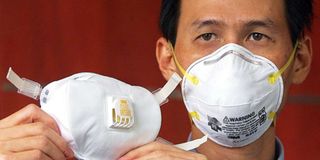To stay alive, choose the right face mask

A 3M staff member wears a N95 mask while holding a N100 mask in Kuala Lumpur . Ahmad Yusni
What you need to know:
- Ideally, masks are aimed at not only protecting the wearer from inhaling the virus from an infected patient, but also the patient from exhaling air-bone droplets the virus to a nearby person or into the air.
For the valved N95 mask, the researchers noted that its performance is likely affected by the exhalation valve which “opens for strong outwards airflow”.
A home-made face mask offers you little protection from the Covid-19 virus, researchers have warned.
This confirms long-held suspicions about the efficacy of a wide array of face masks being sold on the market. Researchers from Duke University in the US put 14 types of masks to the test to find out which offered the most protection from the coronavirus.
The findings were released on Friday in Science Advances, an open access multidisciplinary science journal by the American Association for the Advancement of Science’s (AAAS).
Some of the masks put to test include the surgical, three-layer mask, the N95 mask with exhalation valve, a fitted N95 mask with no exhalation valve, a knitted mask, a two-layer apron mask, cotton masks, a fleece mask, and one made from a bandana.
Ideally, masks are aimed at not only protecting the wearer from inhaling the virus from an infected patient, but also the patient from exhaling air-bone droplets the virus to a nearby person or into the air.
Movement of droplets
For example, surgical face masks were originally introduced to protect patients with open wounds from being infected by members of a surgery team dealing with infectious patients, and spreading diseases like tuberculosis.
In the test, the researchers conducted control trials on subjects without any protective face masks, speaking in the direction of a laser beam inside a dark box as a camera at the back recorded movement of droplets as they were illuminated by the laser in the box.
The subject was then made to say a sentence lasting 10 seconds five times after the camera had rolled for 10 seconds, after which the camera continued for a further 20 seconds. This was done for each of the 14 face masks and was repeated 10 times. The researchers found a transmission rate of 0.1 per cent for the fitted N95 mask, while the fleece mask had a transmission rate of 110 per cent relative to the control trials.
Fleeces are a quite popular clothing which people wrap around their necks or heads especially in the current cold weather and lowered to cover the mouth and nose, and athletes when exercising for convenience.
This extra-high number of droplets from a fleece mask is explained by the fact that the mask dispersed large droplets into a multitude of smaller droplets, leading to the researchers inferring that wearing such a mask is counterproductive in the fight against the spread of Covid-19.
“We were extremely surprised to find that the number of particles measured with the fleece actually exceeded the number of particles measured without wearing any mask,” Martin Fischer, one of the researchers, went on to tell CNN.
“We want to emphasize that we really encourage people to wear masks, but we want them to wear masks that actually work.”
For the valved N95 mask, the researchers noted that its performance is likely affected by the exhalation valve which “opens for strong outwards airflow”.
While the valve does not compromise the protection of the wearer, the researchers say, it can decrease protection of persons surrounding the wearer. For the folded bandana mask, made from simple rolled kerchief, researchers saw a reduction in the rate of droplets emitted by the subject while speaking.
However, decrease was “merely by a factor of two”. For the cotton mask, the speech pattern of the speaker was, unlike in the fleece and bandana masks, no longer recognisable and researchers found that this was a much stronger mask, suppressing most of the droplets compared to the control trial. The cheap masks going for as little as Sh20 in Kenya offer little protection from the virus.
Also, as the performance of the fleece mask shows, keeping a safe social distance is still essential even while wearing a mask, as a person wearing such a mask disperses more air-bone particles into the air, at least 10 per cent higher, than Covid-19 virus carrier wearing no mask at all.
Multi-layered cotton masks, the researchers recommend, are good options as shown by their competitive performance, especially for price-conscious users who may be priced out of the expensive but efficient N95 and surgical masks.





